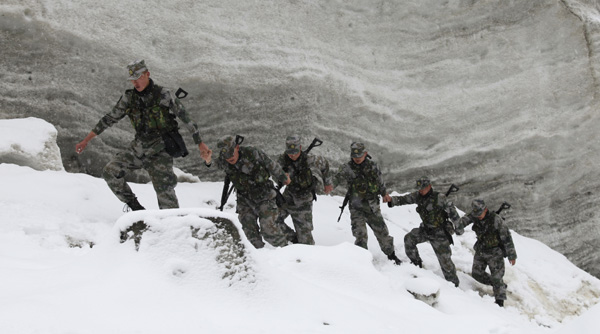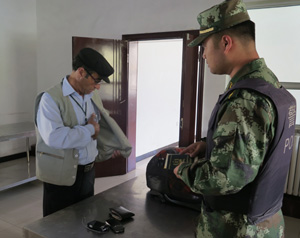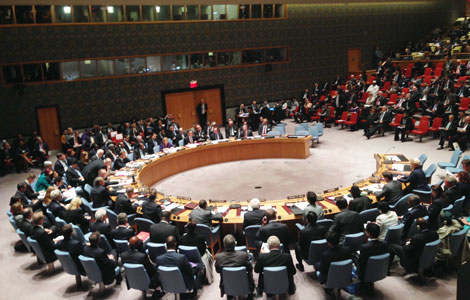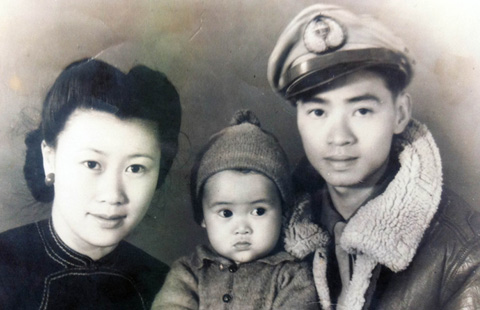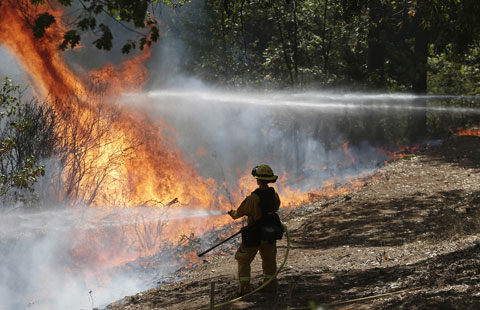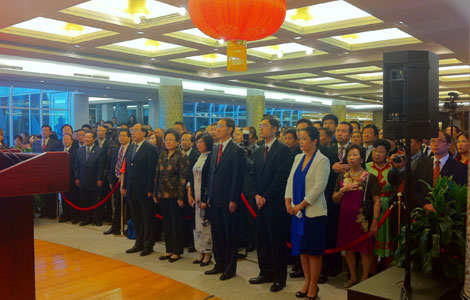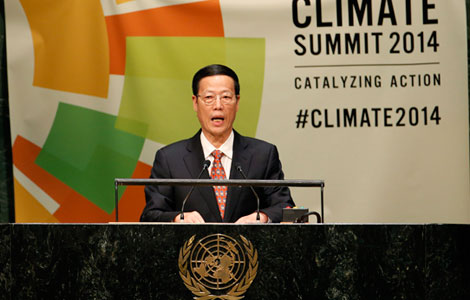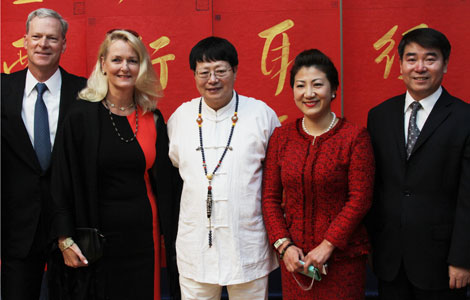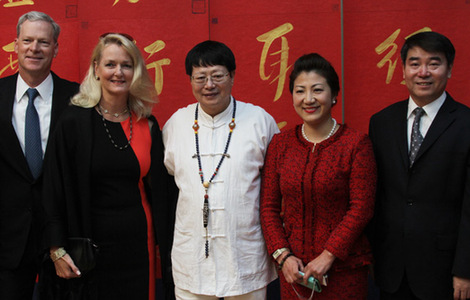High alert
Updated: 2014-09-25 07:10
By Cui Jia(China Daily)
|
||||||||
Chinese troops keep close tabs on terrorist threats at the Wakhan Corridor mountain border area, Cui Jia reports in Kashgar
Tang Zheng stood on top of the brick fort, at 4,300 meters above sea level on the Pamir Plateau.
|
'FRIENDSHIP ROAD' FUELS BUSINESS Pakistani businessman Saifullah Baig has been trading via the Karakoram Highway for more than two decades. He knows that the condition of the highway-the world's highest paved international thoroughfare that connects China and Pakistan-is crucial to business and people's lives. The 1,224 km-long highway starts from Kashgar city in the Xinjiang Uygur autonomous region and ends at the northern Pakistani city of Thakot, crossing the Karakoram mountain range through the Khunjerab Pass in the Tashkurgan Tajik autonomous county. It is also known as the China-Pakistan friendship road. "Sometimes traveling on the road in Pakistan is like being in an airplane because the drop of the mountain is just too high. Looking from above, the cars at the foot of the mountain look like matchboxes. In certain areas, there are about 60 turns within 1 km of the road," Baig, 60, said. The construction of the highway began in the 1960s. More than 700 Chinese and Pakistani workers lost their lives during the process. Baig came up with the idea for his trading business after the highway was completed in 1979 and his wealth has grown steadily since. He is proud that his earnings have enabled him to send both of his children to study in the US. The businessman mainly delivers handicrafts from Pakistan and ships China's silk products back home. Previously, it took 10 days to travel from the Khunjerab Pass to Karachi, the biggest city in Pakistan. Now it takes about four days if there is no earthquake, mud avalanche or fatal traffic accident, Baig said. Baig, who speaks fluent Mandarin, owns a house in Tashkurgan and holds a Chinese residence permit so he can focus on his growing business. He now transports more than 2 tons of goods to China to sell each time, compared to 600 or 700 kg a few years ago. The Chinese and Pakistani governments have decided to repair and expand the road. The upgraded highway will be expanded to 30 meters wide and made suitable for cargo trucks. The project is expected to be completed by the end of 2014. A man from Pakistan and his goods receive border checks at the Khunjerab Pass. CUI JIA/CHINA DAILY |
His troops have been tasked to stop terrorists and religious extremists from sneaking into China from training camps in Pakistan, located on the other side of the mountain.
Tang, 26, said the corridor at the Tashkurgan Tajik autonomous county in Kashgar prefecture, which was once a bustling trade route for merchants on the ancient Silk Road, is now being used by terrorists to get in and out of China.
The Wakhan Corridor in China is actually a valley about 100 kilometers long, running from east to west, with the remaining 300 km in Afghanistan. At the very end of the Chinese side of the corridor lies the only connecting point between China and Afghanistan.
The narrowest part of the valley, which also borders Pakistan and Tajikistan, is less than 1 km wide. Local Tajiks say when a rooster crows in the corridor, it can be heard in four countries, which shows how the location is extremely important.
"With US troops withdrawing from Afghanistan and Pakistani troops constantly busting terrorist cells in their country, their job has become more important and tougher than ever as authorities fear terrorists might flee to China via the Wakhan Corridor," Tang said.
The old fort, which has become a seasonal outpost of the Mingtiegai company lead by Tang, was built by the Kuomintang army to secure China's border in the past. PLA soldiers now take turns to be stationed there from July to October as no one can pass the area when heavy snow seals off the valley.
From higher ground, Tang's men closely observe any activity in the corridor-a passage people must pass if they intend to enter China or Pakistan via the area illegally. Even the sudden movement of sheep or yaks belonging to the local Tajik herdsmen grazing in the valley will alert the troops because it might be caused by strangers. And having strangers in the area is not a good thing.
A surveillance camera powered by solar panels was installed on one side of the fort. On the other side, several scarecrows in PLA uniforms were set up facing the snow-capped mountain. Tang called them "false targets", which he said are as important as the latest military technology.
Mingtiegai means "a thousand camels" in the Tajik language, which perfectly describes the shapes of the mountains on the Pamir Plateau. That is also where Marco Polo discovered a large argali with spiraling horns, which was named after him when the Italian made his way to China.
Traveling westward from the outpost along the valley and almost reaching the border between China and Afghanistan lies Keketuluke, which means "where flowers blossom" in Tajik. But with snow and rocky mountains in the high altitude all year long, the idea of seeing flowers blossom in this area is only a dream.
The troops based there have to bear the harsh environment and try to make the most out of being in a no man's land, said Wang Lie, a political instructor of the battalion in charge of the Wakhan Corridor-based companies.
"A soldier there once asked me if he could have a few days off because he wanted to see a tree," said Wang, 37, who has been serving in the corridor for 18 years.
His skin has become extremely tan after working on the Pamir Plateau, where ultraviolet radiation from the sun is very strong. The PLA has developed a special sunscreen lotion for troops based on high plateau areas. Wang said it works wonders in protecting skin, but getting tanned cannot be prevented.
A barbed wire fence appeared after another 20 km west of Keketuluke. The fence separates China and Afghanistan amid the 92 km border area.
"Although the border between the two countries is not long, separatist extremists and terrorists always attempt to penetrate China through it," Wang said.
Border protection
The Wakhan Corridor was a peaceful area until war broke out in Afghanistan following the Sept 11, 2001, attacks in the US. It has since begun to draw international attention, and the PLA has tightened its border control.
In 2012, a Tajik herdsman informed the troops that suspicious people were spotted at the valley. Soldiers later caught five men who had planned to go to Afghanistan to participate in jihad, or holy war, Wang said.
Some Tajiks have moved to the corridor in the summer for their sheep and yak to graze on the rich grassland. Every time a PLA vehicle drove past the valley, they all came out of their yurts and waved to the soldiers.
"We cannot guard the border without the Tajik herdsmen. We hire their yaks to patrol in the winter and they become our guides. They also provide valuable information about suspicious activities when they graze their sheep," Wang said.
"We are proud to help the soldiers because they are here to protect us," said Wutkar Ablas, 45, who has been herding in the Wakhan Corridor for 20 years.
Wutkar's family is one of the 20 households of Tajik herdsmen in the corridor.
"We all know this valley is important. I even want to spot terrorists here so that we can catch them. If one comes, we will catch one," he said.
"If 100 come, we will catch 100."
Beside outposts, the troops in the Wakhan Corridor have to routinely patrol China's borders with the three countries.
Most Viewed
Editor's Picks

|

|

|

|

|

|
Today's Top News
Obama urges further coalition efforts against IS
China boosts climate efforts
Central Asian nations are ready to roll on the 'new Silk Road'
Ex-Chinese planning official confesses to graft
Alibaba's shares down for second day
Emissions report tells only part of story, expert says
Xi reassures HK on stability issue
Obama, Zhang meet at UN
US Weekly

|

|
